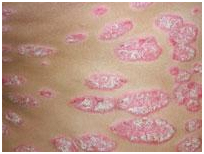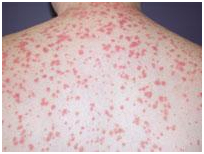Psoriasis
What is Psoriasis?
Psoriasis is a chronic inflammatory skin condition characterised by clearly defined, red and scaly plaques (thickened skin).
Who gets Psoriasis?
Psoriasis affects 2–4% of males and females. It can start at any age including childhood, with peaks of onset at 15–25 years and 50–60 years.
What are the clinical features?
Psoriasis usually presents with symmetrically distributed, red, scaly plaques with well-defined edges. The scale is typically silvery white, except in skin folds where the plaques often appear shiny and they may have a moist peeling surface. The most common sites are scalp, elbows and knees, but any part of the skin can be involved. The plaques are usually very persistent without treatment.


How is Psoriasis diagnosed?
Psoriasis is diagnosed by its clinical features. If necessary, diagnosis is supported by typical skin biopsy findings.
Treatment of Psoriasis:
General advice
Patients with psoriasis should ensure they are well informed about their skin condition and its treatment. There are benefits from not smoking, avoiding excessive alcohol and maintaining optimal weight.
Topical therapy
Mild psoriasis is generally treated with topical agents alone. Which treatment is selected may depend on body site, extent and severity of the psoriasis.
- • Emollients
- • Coal tar preparations
- • Dithranol
- • Salicylic acid
- • Vitamin D analogue (calcipotriol)
- • Topical corticosteroids
- • Calcineurin inhibitor (tacrolimus, pimecrolimus)
Phototherapy
We offer phototherapy with ultraviolet (UV) radiation, often in combination with topical or systemic agents.
We have provision for bath PUVA which is safer as the drug is used topically.
Moderate to severe psoriasis warrants treatment with a systemic agent and/or phototherapy.

